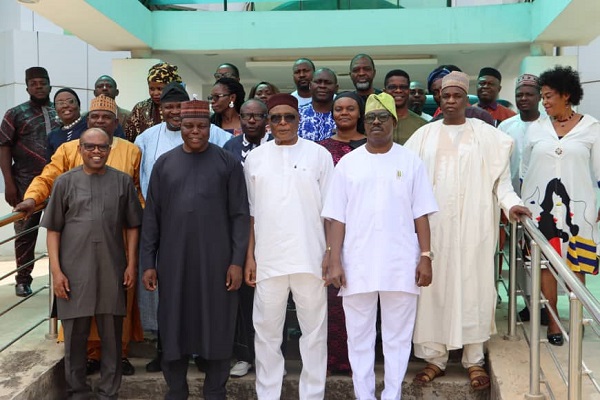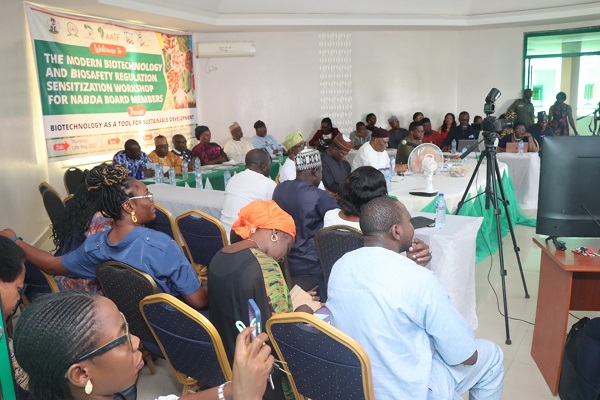…Trains board on biotech/biosafety regulation

The National Biotechnology Development Agency (NABDA) has intensified its campaign for the rapid industrialisation of Nigeria by exploring and harnessing the potentials of biotechnology for national development.
In his remarks during a one-day sensitisation workshop on modern biotechnology and biosafety for members of NABDA board themed:“Biotechnology as a tool for sustainable development”, organised by the Nigeria chapter Open Forum on Agricultural Biotechnology (OFAB) in Africa, an initiative of the African Agricultural Technology Foundation (AATF) under the auspices of NABDA,the agency’s director-general, Prof. Mustapha Abdullahi, said biotechnology is the key to Nigeria’s rapid industrialisation.
He asserted that theworkshop aims to intensify NABDA’s campaign for an industrialised nation through biotechnology adoption and has the objective to strengthen the communication capacity of key influencers and stakeholders of the technology.
Ha added that the workshop is very critical to the attainment of NABDA’s mandate, given the recent developments involving the agency.
Recall that President Muhammadu Buhari recently signed the NABDA Establishment Bill 2022 into law. The Act – gazette (No. 69 Vol. 109) – expanded NABDA’s scope of activities and fully recognises the agency as a research institute with the mandate to create awareness, coordinate, facilitate, deploy, domesticate and carry out research in all the areas of biotechnology for the development of the nation.
“Today’s workshop will empower and update you with recent developments in the agricultural biotechnology and biosafety regulation sectors and the country at large. We expect that as major stakeholders in this sector now, you will join us in the campaign for the enhancement of food security, climate change mitigation, nutritional enhancement, flattening the curve of the COVID-19 pandemic, poverty eradication, wealth creation and overall growth of our country Nigeria. Nigeria being the giant of Africa, if Nigeria gets it right, the whole Africa will get it right,” he added.
In his keynote address, the director-general of the Sheda Science and Technology Complex (SHESTCO), Prof. Paul Onyenekwe, stressed that biotechnology powers green, blue, red, gold, white and yellow economies, and can help Nigeria achieve sustainable national development.
He noted that biotechnology can be deployed to tackle issues of climate change, enhance food security, boost industrial processes, useful in the energy sector, healthcare diagnostics, amongst others,
According to him, biotechnology provides an excellent opportunity to build a sustainable economy, the research agencies can provide this leap via quality research that will lead to good economic policies, and their board will help promote these good economic policies developed by the research institutes.
In his presentation, the director, Next Generation Cassava Breeding Project, IITA, Ibadan, Kubwa Station, Prof. Chiedozie Egesi, identified the application of genetic modification technology as one of the multi-combinatorial approaches with the potential of curbing the multi-dimensional problems of food and nutrition insecurity.
He posited that the application of genetic engineering (GE) has the potential to revolutionize food production, adding, however, that unnecessary fears and concerns fuelled by false information and myths are limiting the application, majorly in regions that need it the most, including Nigeria.
Egesi highlighted possible benefits of genetic engineering to include more nutritious and tastier food, disease and drought-resistant plants that require fewer environmental resources (such as water and fertiliser), less use of pesticides, increased supply of food with reduced cost and longer shelf life and faster-growing plants and animals.
The director noted that Nigeria is already leading Africa to food security (and hopefully including nutrition security) with the commercialisation of two GM Crops – the PBR Cowpea and Bt Cotton. He said with the development of the genetically improved bio-fortified cassava, Nigeria would finally by accelerating the continent’s exit from hidden hunger and other forms of malnutrition.

Similarly, in his presentation on the status of biosafety in Nigeria, the director-general of the National Biosafety Management Agency (NBMA), Dr. Rufus Ebegba, said the agency is charged with the responsibility of providing regulatory framework, institutional and administrative mechanism for safety measures in the application of modern biotechnology and the use and handling of GMOs in Nigeria.
He added that with the NBMA’s amendment Act 2015 to entrench legal, regulatory and administrative mechanisms in the safe application of modern biotechnology and the use of its products, genetically modified organisms (GMOs), including emerging technologies such as synthetic biology, gene editing and gene drive for the advancement of the Nigerian economy in agriculture, industrial raw material production, health and environmental sustainability among others.
Ebegba elucidated that the agency is currently executing its mandate by regulating biotechnology development in Nigeria via various world standard instruments, adding that since its establishment in 2015, the agency has accredited 7 institutions for modern biotechnology practice, approved 13 GMOs for confined field trials in Nigeria, approved 3 GM crops for commercial/general release, granted permits for the importation of 12 GM crops for feed and food processing.
The NBMA boss asserted that safe modern biotechnology has immense potential to grow the economy of any country, stressing it is one of the most regulated sectors in the world. He pointed out the need to make sure that this sector does not cause harm to humans and the environment, saying it gave rise to the regulation of the sector, hence, the government, through the NBMA, has put in place, world-class systems to protect the interest of Nigerians and the environment in the application of modern biotechnology and use of GMOs.
Ebegba clarified that the agency does not promote but ensures that only safe GMOs are released in Nigeria, even as he reassured that the NBMA is well positioned and equipped to carry out its mandate.
He further said that Nigeria’s biosafety regulatory system has opened the door for the achievement of a wide range of crops with potential for economic and national development, adding that it will continue to ensure compliance with safety standards concerning GMOs.
Presenting the agricultural biotechnology advocacy in Nigeria: OFAB Nigeria experience, the country coordinator, OFAB Nigeria, Dr. Rose Gidado, emphasised that the world especially developing countries like Nigeria need new tools to deal with the emergence of new pests exacerbated by climate change and drought.
She added that new, efficient, smart, pleasurable tools are necessary to attract the youth back into farming in the face of the ageing farming population of 65 years and above.
Gidado observed that agricultural biotechnology may play a role in ameliorating the current and future states of the malnourishment pandemic beyond providing increased yields, adding that recent work applied to plants and livestock has indicated that gene editing in agric biotech may effectively increase desirable nutritional metabolites, reduce anti-nutrients and alter macronutrients in ways that can be advantageous for human health- anthocyanins, lycopene, carotenoids.
She elucidated that OFAB Africa was initiated by the AATF to tackle the challenge of misinformation concerning the application of modern agricultural biotechnology. She said OFAB Nigeria has been living up to its task of disseminating credible facts and prospects of biotech by building and deploying the strategic partnership of the media as well as carrying the masses along in its various activities through various channels of advocacy.
“OFAB Nigeria is multi-stakeholder and multi-disciplinary and draws from a wide range of expertise. It has been enjoying significant convening power, demonstrated through its track record of organising regular monthly meetings which attract large/diverse audiences and prominent speakers from all over the world,” she added.


